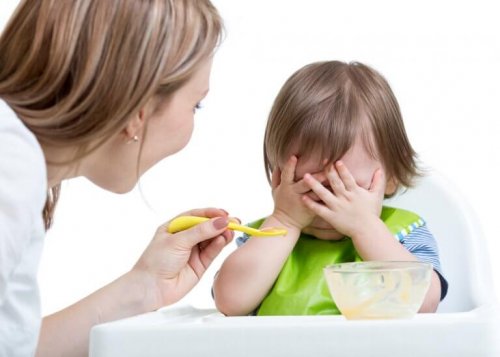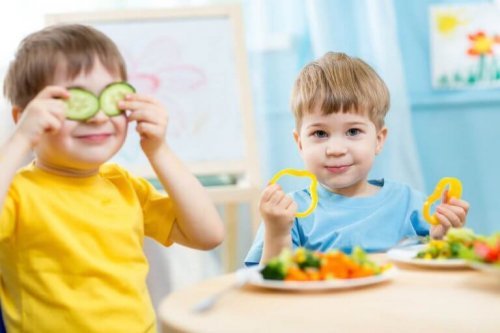What to Do When Your Kids Don't Want to Eat

A lot of parents get concerned when their kids don’t want to eat. Generally, there’s nothing to worry about, because this is usually a stage that they’ll overcome later in life. However, if the pediatrician says it’s necessary, you may need to help your child gain weight.
As a baby, your child will grow rapidly, so it’s common for babies to eat a lot of food.
However, between the ages of 2 and 5, the infantile appetite appears. This stage can even last until they’re 6 or 7 years old. When it comes to meal time, the child probably refuses to eat the food and says s/he doesn’t like it. As a result, the parents may try forcing the child, may offer treats or may try punishing him.
That’s when mealtime becomes a battle.
Learning to Eat

The start of complementary feeding is an awakening of flavors for the baby’s palate. At first, s/he will just drink milk. As the child grows, s/he’ll begin to eat solid foods and will be eager to try more and eat more. She or he will probably love to eat. As children grow, though, they often lose that desire to eat.
After their first year of life, several factors will start to impact children’s desire to eat. Their growth rate will slow down and they’ll become full faster. In addition, their interest in the world around them will make them put food on the back burner.
As children grow, they’ll start to only prefer a few foods in small quantities. As a parent, you’ll probably start to worry. Parents are constantly asking their pediatricians questions about food, and they’ll even turn to internet forums because their children don’t want to eat.
When parents are concerned about their child’s nutrition, they may force them to eat more food than they actually need. Other parents may insist that their children eat everything, regardless of their taste preferences.
However, the real issue with a child not eating is when his/her weight is affected.
Read this article: 13 Foods That Will Improve Your Children’s Concentration
When Kids Don’t Want to Eat

Additionally, there may also be a natural cause for your child’s lack of appetite. A chronic illness, a flu-like illness or an acute infection will make your child refuse to eat. This will only last for a short period, however, and once they feel better, they’ll have a better appetite.
The real issue is when children are hungry but they only try to satisfy that hunger by eating foods that are appetizing to them. Of course, parents play a key role in resolving this issue.
If the parents’ concern creates a tense environment at mealtimes, the child’s negative attitude towards food will only get worse. Additionally, if the child only wants to eat the food s/he likes, and the parents give in to him or her, it will set a negative expectation.
The child will then refuse to eat regular foods because s/he knows that when s/he feels hungry, his/her parents will give him or whatever s/he wants. If this conflict continues, the child’s health can be affected.
As a result, a doctor may tell you that s/he needs help gaining weight.
How to Help a Child Gain Weight the Healthy Way

Children learn to eat the amount of food they need to feel full. If they’re healthy, happy children who are growing at the right pace, you shouldn’t worry too much about the percentile they’re at on growth charts.
Parents should only worry about creating a pleasant environment at mealtimes and about giving their kids a healthy diet. However, if they start to lose a lot of weight, a pediatrician may tell you they need to gain weight.
Below, we’ll give you some basic recommendations to help with nutrition and to get your child to eat, if this is your case:
- Introduce new foods in a progressive and attractive way. If your child repeatedly refuses to eat a food, try to offer a different food that has similar nutrients.
- Be an example. As much as kids don’t like trying new foods, if they see their parents eating it, sooner or later, they’ll want to try it as well. That’s why it’s so important to eat at the table with the whole family and without personalized menus.
- Take advantage of their preferences when adding new foods to their diet. There’s no limit to creativity when it comes to cooking and offering options that will encourage your kids to eat. It matters what the food looks like, so be creative.
- If your kids don’t want to eat new foods, be patient and keep trying. Don’t get angry. If the child’s refusal isn’t followed by negative reactions, like nausea or vomiting, little by little your child will learn to eat the new food.
- After an infection, it’s normal for a child to lose weight, but it tends to come back quickly. Take advantage of children’s restored appetite to help them gain weight if they’re underweight.
Discover: 7 Foods to Help You Gain Weight Healthily
Final Thoughts
Remember, it’s not just about gaining weight. Excessive consumption of sugary foods that are chemically processed and high in trans fats shouldn’t be used to help your child gain weight. Childhood obesity is a serious problem that you should avoid at all costs.
In addition, mealtime should be a pleasant time for the whole family. This positive relationship will influence your child’s appetite and make it better. Actually, that goes for everyone – regardless of age!
When the child associates eating with something nice, they’ll have an easier time overcoming their lack of appetite. If your child doesn’t eat well, your pediatrician may recommend giving her or him vitamins or food supplements to promote healthy weight gain.
All cited sources were thoroughly reviewed by our team to ensure their quality, reliability, currency, and validity. The bibliography of this article was considered reliable and of academic or scientific accuracy.
- Arnal, Rafael Ballester, and Mari Carmen Guirado. “Detección de conductas alimentarias de riesgo en niños de once a catorce años.” Psicothema 15.4 (2003): 556-562.
- Castillo, Patricia. La alimentación de tu hijo. Editorial Planeta, SA (Barcelona), 1996.
- Loureiro, Sofía. Guía de remedios naturales para niños. Grupo Planeta Spain, 2013.
-
Cevallos, Á. L. Z., Castellano, L. G. P., Barre, J. E. L., Rivas, M. E. O., Romero, A. A. A., & Véliz, R. I. R. (2019). Nutrición fundamental en infantes desde 1 a 5 años de edad. RECIMUNDO, 3(2), 934-963.
-
Ducuara-Mora, P. E. (2011). Consideraciones sobre la inapetencia infantil y la adopción de hábitos alimentarios saludables. CES Medicina, 25(2), 153-167.
This text is provided for informational purposes only and does not replace consultation with a professional. If in doubt, consult your specialist.








